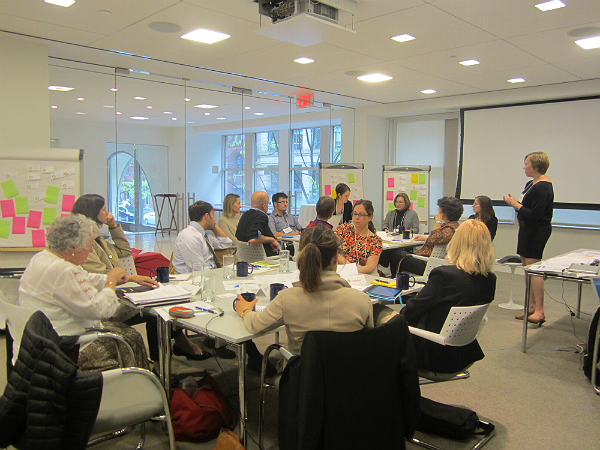Taking Stock of LEO's Learning Agenda

The first seven months of USAID’s Leveraging Economic Opportunities (LEO) project laid the foundation for the its forthcoming work in inclusion and scaling through market systems. On April 30, the LEO project stopped to take stock of advances made during this period. The one-day event brought together members of the project technical committee, key researchers, and representatives from USAID to look at the interconnected elements of the LEO learning agenda. During the day, 30 participants from USAID, ACDI/VOCA, SEEP Network, Impact LLC, EcoVentures International, Adam Smith International, and others discussed cutting-edge thinking on inclusive market systems and priorities for moving forward.
Dr. Jeanne Downing, Senior Enterprise Development Advisor in USAID’s Bureau of Economic Growth, Education and Environment (E3), opened the day with comments on the importance and timeliness of the LEO learning agenda. She noted that LEO’s emphases on market systems, facilitation, and monitoring of indirect contacts were particularly relevant to Feed the Future programs.
ACDI/VOCA’s program manager for LEO, Ruth Campbell, then presented on the project’s evolving market systems framework. This framework aims to broaden thinking about market-based poverty reduction. It moves beyond a focus on isolated value chains to look more holistically at the interaction among market systems and ecosystems, education and health, and others.
Event participants explored the implications of applying an inclusive market systems development framework to the project cycle. Through interactive sessions, they examined the requirements of systems thinking:
- broader analysis, including examination of interconnected systems, using network mapping to understand system boundaries, and identifying the rules and knowledge flows;
- feedback loops to track system responses to interventions and continually integrate emerging learning into management decisions;
- implementation tactics that reflect the level of system complexity;
- flexible project design to allow facilitators to stimulate and respond to shifts in the behavior of market system participants; and
- appropriate indicators that track early signs of systemic change and capture the full extent of benefits arising from activities implemented through a facilitation approach.
During the afternoon, the inclusiveness of market systems development was explored through a three-pronged focus on: women’s empowerment; push/pull approaches to reaching the very poor; and building household resilience through markets. Also addressed was the need to build the resilience of markets to withstand shocks. Jennefer Sebstad, senior technical advisor for USAID/E3, spoke about the multiple dimensions of inclusion, and the need for donors and implementers to see the poor as economic participants throughout the market system (e.g., as service providers, consumers, laborers, and traders).
Through this learning event, LEO partners were able to explore synergies among their areas of research and learning. This strengthened the LEO project’s learning agenda and will accelerate the development of practical resources for USAID and its implementing partners.


